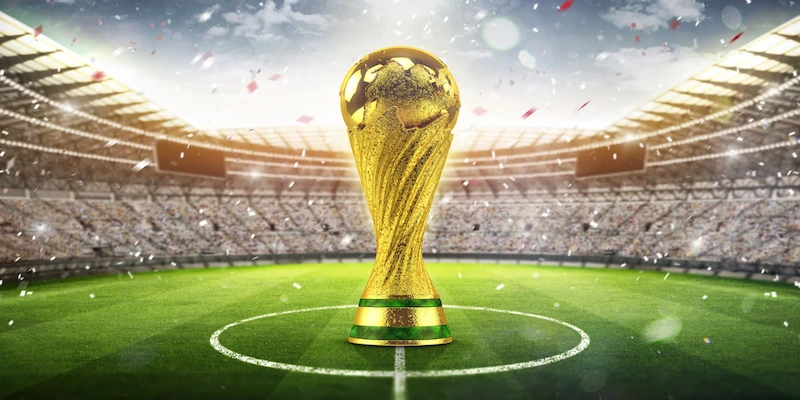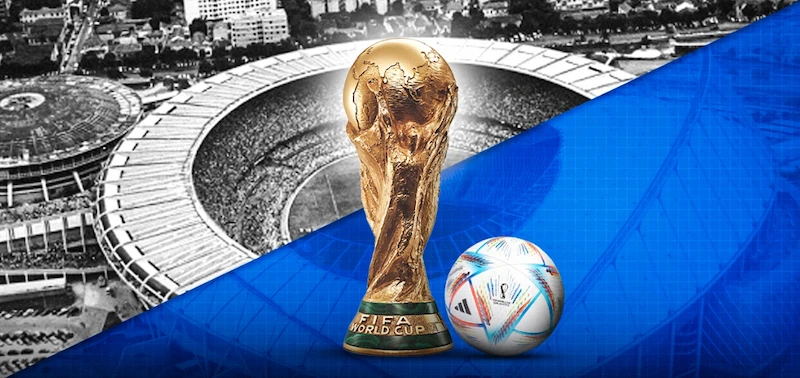Each World Cup is not only a competition between the best teams on the planet, but also a global sporting event. The FIFA World Cup is where emotions, national pride, and historical moments come together. From Zidane’s classic volley in 1998 to Maradona’s “Hand of God” goal in 1986, all contribute to creating an immortal legacy. Join 5JILI to learn about the biggest football festival on the planet!
Introduction to the World Cup: What is the World Cup?

The World Cup (FIFA World Cup) is the world football championship organized by the International Federation of Association Football (FIFA). This is not only a regular football tournament but also a global sports symbol, where football elites from all continents converge. This is the most attractive event on the planet, attracting billions of viewers to watch live and on television each time it is held. According to FIFA statistics, the 2018 World Cup had more than 3.5 billion viewers, equivalent to nearly half of the world’s population.
The tournament takes place every 4 years, and is the biggest stage for national teams to affirm their class and football tradition. Moreover, the World Cup is not only a place for top superstars to compete but also a launching pad for many generations of talented players. Names such as Pelé (Brazil, 1958), Diego Maradona (Argentina, 1986), and Kylian Mbappé (France, 2018) all shone from this stage.
In addition to the professional factor, the World Cup also reflects the changes in football through each historical period. From the matches on the muddy grass field in 1930 to stadiums, applying modern VAR technology today, the tournament has witnessed the continuous development of the king of sports. In addition, the World Cup also has profound cultural and social significance, as each organization leaves an impression of solidarity, national pride, and values beyond sports.
History of the FIFA World Cup
The Birth of the World Cup
Before the World Cup, international football was organised through the Olympic Games, where national teams competed but were limited by regulations for amateur players. Realising the potential for a tournament dedicated to professional football, FIFA, led by President Jules Rimet, proposed organising a separate tournament.
In 1930, the first World Cup was held in Uruguay with the participation of 13 teams. Uruguay, as the reigning Olympic champions and also the host country, won the title after defeating Argentina 4-2 in the final. Despite the modest number of teams participating, this event laid the foundation for a tournament of global stature.

Key Developments
- 1934–1950: The World Cup gradually attracted more and more international attention, with the number of teams increasing to 16 in the 1934 tournament. However, World War II interrupted the World Cup in 1942 and 1946.
- 1954–1998: This was a period when the World Cup expanded in scale and saw the explosion of modern football. The participation of teams from Africa, Asia, and North America helped make the tournament truly global. Notably, the 1970 World Cup in Mexico marked the first time the tournament was broadcast in color on television, ushering in an era of strong commercialization.
- From 2002 to present: The World Cup has continuously expanded its scope, with the first time being held in Asia (Japan – Korea, 2002), Africa (South Africa, 2010), and the Middle East (Qatar, 2022). This event not only helps football develop more strongly in new regions but also affirms the global popularity of the World Cup.
- World Cup 2026: The tournament will witness a landmark change when the number of participating teams increases from 32 to 48. This will be the first World Cup co-hosted by 3 countries (USA, Canada, Mexico), promising to create more opportunities for emerging teams, while increasing the attractiveness of the tournament.
FIFA World Cup Competition Format
With hundreds of teams from around the world participating, the World Cup has a strict competition system, consisting of two main stages: qualifying and finals.

Qualifying
The qualifying process takes place approximately three years before the finals, with more than 200 national teams from six continental confederations participating:
- Europe (UEFA): 13 places
- South America (CONMEBOL): 4-5 places
- Africa (CAF): 5 places
- Asia (AFC): 4-5 places
- North, Central America & Caribbean (CONCACAF): 3-4 places
- Oceania (OFC): 0-1 place (usually play-offs)
Teams compete in their regional competition system to qualify for the finals. The qualifying rounds are not only a test of ability but also bring many classic matches, such as the 2018 World Cup qualifying round, which saw Italy shocked by being eliminated after losing to Sweden.
Final Round
Since 1998, the World Cup has had 32 teams competing in the final round, divided into the following stages:
Group stage:
32 teams are divided into 8 groups of 4 teams each.
The teams compete in a round-robin format.
The top two teams in each group advance to the knockout round.
Knockout round:
Starting from the round of 16, matches are played in a knockout format.
If the score is tied after 90 minutes, the two teams play extra time. If the score is still tied, the winner is decided by a penalty shootout.
The quarter-finals, semi-finals, and final continue to use this format.
The Final: This is the most anticipated match, where the two strongest teams compete for the FIFA World Cup Trophy. Classic finals such as Brazil vs Italy (1994), France vs Argentina (2022) have left a deep mark in football history.
From 2026, with the expansion to 48 teams, the World Cup will have a new competition format:
12 groups, each group has 4 teams. The number of matches increased from 64 to 104, creating more opportunities for emerging teams. The knockout round is expected to start from the round of 32 instead of 16. This change is expected to make the tournament more competitive, while opening up opportunities for many teams to participate in the biggest on the planet for the first time.
Most Successful Teams at the World Cup

- Brazil: 5 titles (1958, 1962, 1970, 1994, 2002) – the most successful team.
- Germany & Italy: 4 titles each.
- Argentina: 3 titles (1978, 1986, 2022).
- France, Uruguay: 2 titles.
- England, Spain: 1 title.
